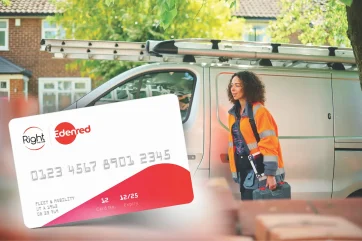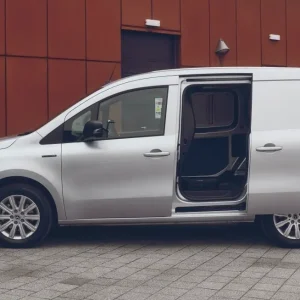
Businesses that provide goods and services to light commercial operators are invariably eager to add more products to their sales armoury. Their aims are to boost profits and build customer loyalty – if they can sell you most of what you require, then why would you look elsewhere?
Van rental giant Northgate has certainly widened its portfolio in recent years.
As well as light commercial hire, it can offer telematics packages, accident management, driving licence checks, online driver training courses and a host of other extras, including fuel cards.
“We’ve got over 5,000 cards in circulation and our users buy 500,000 to 700,000 litres of fuel a month,” says head of product and specialist sales, Joshua Hooper.
The package Northgate offers has been put together in conjunction with global commerce platform WEX, which owns Esso Card. Northgate’s plastic is also accepted at Shell and BP branded forecourts, which means it can be used at over 3,600 fuel outlets.
So why bother with a fuel card? A key reason is the savings that can be made, says Hooper.
“If you use our card, then you’re generally talking about a 6p per litre discount on average on the posted pump price,” he says. “It varies a bit from one network to another, but typically you’ll do better at Esso forecourts.”
It was up to a healthy 9.7p a litre on average at Esso service stations at the
time of writing. The saving at Shell and BP outlets is significantly lower, but still worth having.
The discount offered is not volume-related and Northgate does not charge for the cards it supplies, says Hooper. Nor do you have to be a major fleet to obtain one – you can be a one-man-band.
Bear in mind that a van owned by a small business delivering parcels and packages on behalf of an online retailer can clock up a huge daily mileage, especially if it is double-shifted. That means the business concerned will purchase large volumes of diesel and is likely to appreciate the additional line of credit a fuel card provides.
Payments have to be made on a weekly basis by direct debit so you will need to ensure you have sufficient funds available. The weekly invoices the system generates meet the requirements of HM Revenue and Customs, says Northgate.
Aside from cost savings, another sound reason for using a fuel card is the audit trail that it generates. By using an online account management system set up by WEX under the Velocity banner, van operators who have opted for a Northgate card can see where and when fuel was purchased, by whom and how much went into the vehicle concerned.
If a van seems to be burning a lot of fuel, then maybe it has a fault and needs to visit a workshop to get it fixed. Perhaps the regular driver has a heavy right foot and would benefit from remedial training. There could of course be another explanation – fraud. Maybe some of that diesel is going into their own car.
“If you use our telematics service however, you can check on a van’s whereabouts,” says Hooper.
If it was on the forecourt next to the pump at the time the fuel purchase was made, well and good.
If it was parked on the regular user’s drive, however, then alarm bells should ring. He or she could have been using the card to refuel their partner’s SUV.
“The set-up we have makes it easy for operators to add cards and replace cards that have been lost,” Hooper says. Cards that have mysteriously vanished can
be cancelled.
Cards can be assigned to an individual driver, or to a vehicle, with more assigned to the latter in Northgate’s experience. They can be used to purchase AdBlue,
van wash tokens, and other vehicle-related items if that is what the customer requires, but not sandwiches, confectionary or cigarettes.
Northgate also offers a card through a separate provider that can be used if a driver needs to charge up an electric light commercial at a public charging point.
The advantages of combining fuel cards with telematics have not been lost on
Right Fuel Card, which is partnering with telematics specialist Quartix to do exactly that.
It agrees that integrating fuel card data with telematics tracking data can help prevent card misuse. Doing so can also help operators optimise the routes they use with an eye to realising cost savings.
Right Fuel Card has additionally inked a deal with Rightcharge, which means it can now provide operators with a card that drivers with electric vans can use at over 62,000 charging points across 39 networks. It means there is no need to mess about trying to use individual networks apps and websites, an inconvenience and an annoyance.
The card works alongside the Rightcharge smartphone app so that available charging points can be located.
A Rightcharge card costs £4.99 a month per driver and the data available to operators allows them to select the most cost-effective and convenient charging points for their employees. Using a public charging point can be eye-wateringly expensive, so any saving that can be achieved has to be applauded.
Rightcharge can also help businesses manage the reimbursement of drivers who charge up their vans using domestic charging points.
Right Fuel Card offers a variety of other cards bearing familiar brands such as Shell, Esso, BP and Texaco. Businesses can set a limit on how much users can spend,
it points out, while fixed weekly pricing aids budgeting and insulates firms from nasty shocks.
When they select a card, businesses should think about the destinations their drivers regularly visit and how many forecourts along the way accept the card concerned. There is little point in issuing them with plastic they cannot easily use.
Card provider Fleetmaxx Solutions warns that some fuel card suppliers may make hidden charges for services you may not be aware of, or did not agree to, such as carbon counting and card protection. Some suppliers may levy a charge of up to £2.00 every time a driver fills up, so make sure you check every invoice you receive and challenge every figure that doesn’t look right.
Many fleets operate a mixture of diesel and electric vans, so having a card that can be used for both types of vehicle can make sense says Fleetmaxx.
Its portfolio includes the Shell EV CRT card. It can be used to purchase diesel
at 1,100 forecourts and electricity at over 11,000 charging points across the Shell Recharge network.
But why bother with bits of plastic? Why not use an app on a smartphone as a digital fuel card instead?
It is an approach being pursued by independent fuel distributor Certas Energy, which has recently relaunched one under the FuelTapp banner. Changes include the use of facial identification when a card is being applied for, cross-checking your picture with the photograph on your driver’s licence.
As things stand, FuelTapp can be used at any one of the company’s own publicly accessible refuelling sites nationwide. It operates 17, including locations in Manchester, Liverpool, Northampton, Southampton and Portsmouth.
Advantages of using a smartphone app to refuel include security, says Certas head of fuel cards, Andrew Goodwin.
The app is unlocked using facial recognition or a fingerprint. “Then when you come to refuel, it generates a random single-use PIN number for you to use,” he says.
That clearly cannot happen with a plastic fuel card, and it is not unknown for drivers to write the relevant PIN number on the card so their colleagues can use it, or in case they forget it. That makes it easy for the card to be used fraudulently.
Although smartphone theft is by no means unknown, phones are on balance probably less likely to get lost, stolen, mislaid or damaged than plastic. Phones also tend not to be used to scrape the ice off windscreens in bitter winter weather. Cards do.
Fuel card theft and cloning have worsened significantly in recent years, says Certas, and are costing businesses thousands of pounds. At the time of writing however, FuelTapp customers had reported zero incidents of fraud or crime says the company.
An environmental benefit is that using a phone app means that less plastic and paper has to be used.
But not everybody is convinced. Observes Hooper: “One difficulty with using a smartphone app is that not all companies provide their drivers with a work phone, and they may be nervous about putting a digital fuel card on an employee’s personal device. Then there is the question about what you do if the card is assigned to a van rather than a driver.”
Fortunately, Certas also offers a conventional fuel card which is accepted at over 4,000 forecourts, including supermarkets, selling a variety of different brands of diesel and petrol. “Typically, it will get you a discount of 5p to 7p a litre and we’ve got thousands of these cards in circulation,” Goodwin says.
“Standard payment terms are seven to 14 days by direct debit,” he continues. “The cards are free, although there are occasions when we might have to make an administration charge.”
One option major fleets can consider pursuing is bunkering; buying diesel in bulk every month, arranging for it to be deposited with the network of their choice and issuing drivers with fuel cards so they can draw on it as and when required. Depending on how much diesel is purchased, the pence-per-litre saving can be substantial – and one well worth having in today’s increasingly tough times.
Electric discounts
Discounts for fuel card holders who charge up electric vans using public charging points are rare at present, but they are not unknown. So says David James, director of revenue at Right Fuel Card.
“You may be able to get a 10% saving if you use a charging point at between 8pm and 6am with some networks,” he observes.
Short-term discounts may also be offered if too much electricity is being fed into the grid. “They may last for an hour or two, then be withdrawn,” he says.
Right Fuel Card aims to introduce a digital fuel card using an app on a smartphone during the last quarter of next year or the first quarter of 2027. James believes there is a demand for one.
“I was recently talking to an operator with a large fleet of vans who told me that if we could offer a digital wallet then he would sign up to it immediately,” he says.
The problem with plastic cards is that they expire every couple of years and are frequently lost, says James.





